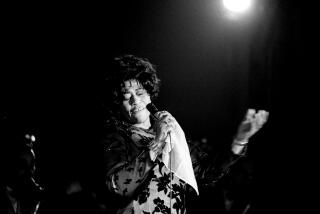Frank Emilio Flynn; Pioneer of Cuban Jazz
- Share via
Frank Emilio Flynn, the blind Cuban pianist whose career spanned seven decades and bridged musical styles as disparate as the courtly contredanse and the improvisational descarga, has died. He was 80.
The frail but still active musician was at his piano when he had a heart attack Thursday night and died at his home in Havana, said his cousin Kathy Flynn of West Los Angeles. Granma, Cuba’s official newspaper, reported that Flynn was buried Friday at the Colon cemetery in Havana, the city of his birth.
The legendary pianist and composer had lived in Los Angeles for several months earlier this year after his cousin reunited the American and Cuban sides of the Flynn family. The visit featured some of his final public performances, including a guest appearance June 3 with the Latin Jazz Ensemble of Cal State L.A., where he taught a spring series of classes as artist in residence.
During his stay, local fans flocked to greet the diminutive musician, who was influenced by or worked with several seminal figures of Afro-Cuban music, such as danzon master Antonio Maria Romeu and percussionist Tata Guines, a founding member of Flynn’s respected 1950s quintet, Los Amigos.
“We created a whole new family here,” said Kathy Flynn, whose great-uncle, Francis Joseph Flynn, was the late musician’s father. “He was just such a beautiful person. He continued to care about people, despite all that he had to go through.”
Francisco Emilio Flynn Rodriguez was born in 1921, his eyesight damaged by forceps during delivery. His mother died before his fifth birthday and his father returned to the United States months later, leaving the boy in the care of his Cuban aunt and uncle.
At 13, Flynn won an amateur contest and started his career as part of a danzon orchestra, featuring the graceful ballroom music that preceded the mambo and cha-cha. But tragedy struck again in his late teens when a tuberculosis epidemic claimed the lives of his surrogate parents. By then, Flynn had gone totally blind.
At the Forefront of a Musical Movement
He continued his studies at a school operated by Cuba’s National Assn. for the Blind, of which he would later serve as president from 1978-81. In the mid-1940s, Flynn resumed his popular music career with his band Loquibambia, featuring Omara Portuondo of Buena Vista Social Club fame. That placed Flynn at the forefront of a movement called filin, which fused the traditional Cuban bolero with U.S. jazz sensibilities.
But times were hard and Flynn made ends meet by selling cigars to shops on consignment, walking the streets of Havana without a cane. In the 1950s, he became a charter member of the Club Cubano de Jazz, a group of enthusiasts who played descargas, or jam sessions, for free and raised money to sponsor visits by jazz colleagues from the U.S.
By the end of the decade, Flynn led the seminal Quinteto Instrumental de Musica Moderna, devoted to exploring Latin jazz. At the same time, he pursued the study of classical music, which remained his true artistic ambition. He cherished his recordings by Cuba’s semiclassical composers Ignacio Cervantes and Ernesto Lecuona, author of “Malaguena” and “Siboney.”
Until his death, Flynn was thankful to his friend and fellow musician Armando Romeu Gonzalez, who learned Braille to help him make the first transcriptions of Lecuona’s compositions. Flynn was also proud of having developed a technique for teaching the blind to write music, countering their natural tendency to learn by ear.
“If they want to be musicians,” he told The Times in April, “they have to be the real thing.”
In February 1998, two years before his family reunion, Flynn made his U.S. debut in New York at a climactic concert, part of the Jazz at Lincoln Center program. Latin giants such as the late Tito Puente turned out to watch an all-star reincarnation of Los Amigos, featuring bassist Orlando “Cachaito” Lopez; percussionist Jose “Changuito” Quintana, formerly of Los Van Van; and Guines, the group’s original conguero.
“Frank Emilio is a pianist who has influenced every subsequent generation, and those to come, because he’s kept up to date,” Cuban pianist Chucho Valdes, who made a guest appearance at the concert, said at the time. “You can’t talk about Frank Emilio in the past because he’s still very much present.”
Flynn leaves his wife of 47 years, Martha Montes Cobian; his son, Jesus; and a granddaughter.
More to Read
The biggest entertainment stories
Get our big stories about Hollywood, film, television, music, arts, culture and more right in your inbox as soon as they publish.
You may occasionally receive promotional content from the Los Angeles Times.










